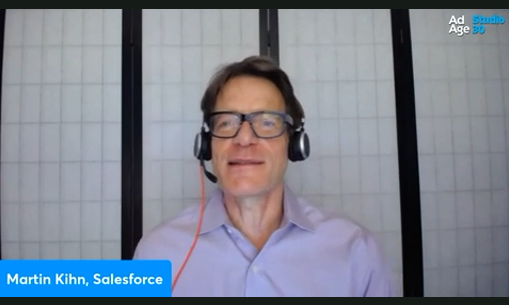By Abimbola Mohammed
At the just concluded webinar held by Adage in collaboration with Salesforce, a cloud-based software company, Martin Kihn, Senior VP, Product Strategy, Marketing Cloud, Salesforce, adviced marketers to find a way to deal with consumers as they are growing less tolerant to any kind of fruition, while patronizing any brand or product.
According to Kihn, consumer behaviour and expectations have changed in the past few years as they expect their needs to be considered at every point in time, with personalized experience when dealing with brands even though they are reluctant to share their personal data.
“The thing is that consumer behaviour and expectations have changed overtime, they expect personalization but also don’t want to surrender data for personalization. I think they have become more and more demanding over time without knowing. We as marketers have heard that one or two to three customers will immediately switch because of a single bad experience, so they are less tolerant to any kind of fruition in any service, not only in marketing,” he said.
Kihn believes that marketing had a harder time than other functions because of the pandemic, and that marketers had to adapt to something which was not predicted. He noted that consumer behaviour and attitudes have changed over the last two years.
Analyzing the growth in the ecommerce sector in the last two and a half years, he said: “In the last two years, there has been sixty-five percent growth in ecommerce sales because of the massive switch to digital, also opening of different new channels that in the past weren’t particularly digital. An example is car sales; because you could do hand to hand purchase of vehicle and it could arrive at your lawn, you don’t have to go to showroom anymore.”
Speaking to the challenges and key obstacles that prevent most marketers from assessing their data with the speed necessary to drive conversation across categories, and what changes marketers implement now to achieve the speed they need to achieve their goals, he said: “Information shows that there has been some decrease in investment and that is because we live less of our lives in real-life and this is because consumers are now aware of data. About five to fifteen years ago, most of us didn’t think of what data to be collected specifically or in any deep way. But now we are aware or need to be aware that regulators made us aware of data that has been collected.
“We have seen forty-eight percent of responses from brands specifically about data privacy, so it raises the premium of trust with a particular brand. To present them as a trusted but also transparent brand, to be clear about the data they are collecting, but also showing you what the purposes we are using it for, and I think that is common now in the mainstream consumer.”
Speaking on how marketers will gather data or analyze data in the cookie-less future and how the changes will affect strategies, Kihn said: “That is why there has been emphasis on how first-party data is collected from customers in a transparent and open way. This is part of the exchange of value that is important for media and media targeting. For media, you need a core set of first party IDs as a seed to send over to the intermediate networks in order to find targeted people, because the future of cookies is in some way in the customer data.”






Comment
No comments found.